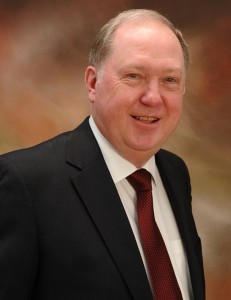B.S. in Computer Science, 1973
Mike Strain’s inspiration to pursue an education in computer science came from an unusual source: a three-year stint in the United States Army. He began as a private and rose to the rank of first lieutenant after attending Signal Corps Officer Candidate School. Although Mr. Strain had worked on mainframe computers for GE prior to joining the Army, the prevalence of computerized communications in the Army convinced him that computers were going to be the future and a computer science degree would be his entry into that world. He enrolled at the University of Kentucky in 1970 and remained in the Army Reserve while in school, eventually attaining the rank of captain. During his last year at UK he gained more computer experience as the night computer operator at Citizens Union National Bank using an NCR mainframe.
After graduating with a bachelor’s degree in computer science in 1973, Mr. Strain moved to Dayton, Ohio, to work for NCR. At that time, microprocessors were making their way into the industrial world and Mr. Strain used second generation microprocessors from Motorola and Intel to help design NCR’s first modular bank teller machines and ATMs. After two years, Mr. Strain went to work for Texas Instruments (TI) in Austin, Texas—then the 3rd largest manufacturer of minicomputers. He initially wrote production line test software and field service diagnostics, but later transferred to Houston where he became more involved in the business as the marketing manager for a new line of 8-bit microprocessors.
After seven and a half years, Mr. Strain left TI and, with two other engineers, started a consulting company in Houston called Cyber Sciences. In 1984, they sold the company to GeoQuest Systems. The experience of starting a company coupled with his desire to get back into microprocessor design led Mr. Strain to leave GeoQuest Systems in 1986 and found Spectrum Digital, Inc.
To sustain itself after the initial launch, Spectrum Digital performed custom hardware and software design work for large customers, delivering advanced products such as a high-end color graphics card for an IBM PC, and a Power Monitor Metering system for Square D—an innovation so successful that the Power Monitor group became a 250 employee division. In time, they began creating their own, highly successful products.
Spectrum Digital’s strength lies in generating development tools that allow engineers and programmers to develop with new technology. Over the last 29 years, it has gone from a three person design group to a fully integrated company that sells products worldwide. The company targets high growth, large volume markets that require specialized technology and is the largest provider of development boards and emulators for TI microprocessors.
Mr. Strain maintains strong ties to UK. From 2002-2006, he was president of the Greater Houston UK Alumni Club and he serves on the college’s Department of Computer Science advisory board. He is also a former president of the Houston chapter of the Association for Computing Machinery (ACM).
Mr. Strain lives in Sugar Land, Texas, with his wife, Doris. They have two children, Troy and Bart, and one grandson.
